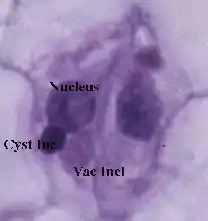Tobacco ringspot virus
Tobacco ringspot virus (TRSV) is a plant pathogenic virus in the plant virus family Secoviridae. It is the type species of the genus Nepovirus. Nepoviruses are transmitted between plants by nematodes, thrips, mites, grasshoppers, and flea beetles.[1] TRSV is also easily transmitted by sap inoculation and transmission in seeds has been reported.[2] In recent cases it has also been shown to appear in bees, but no transmission to plants from bees has been noted.[3]
| Tobacco ringspot virus | |
|---|---|
| Virus classification | |
| (unranked): | Virus |
| Realm: | Riboviria |
| Kingdom: | Orthornavirae |
| Phylum: | Pisuviricota |
| Class: | Pisoniviricetes |
| Order: | Picornavirales |
| Family: | Secoviridae |
| Genus: | Nepovirus |
| Species: | Tobacco ringspot virus |
TRSV was observed for the first time in tobacco fields in Virginia and described in 1927.[4] It is an isometric particle[5] with a bipartite RNA genome. The virus has a wide host range[6] that includes field grown crops, ornamentals and weeds. Its name comes from its most common symptom being chlorotic ringspots on the leaves of infected plants.[7] In some areas this virus has caused growers to stop growing affected crops.[8]
A. B.  C.
C. 
Symptoms and virus inclusions of Tobacco ringspot nepovirus in the host Zamia furfuracea, the Cardboard Cycad.[9] A. The first symptoms seen were chlorotic ringspots. With time they become necrotic. B. There are two types of inclusions found in leaf strips stained with Azure A (nucleic acid stain),[10] one is vacuolate (Vac Inc) and the other more crystalloid (Cyst Inc - darker spots). C. Vacuolate inclusions only.
See also
References
- Isakeit T (2008). "Tobacco Ringspot Virus of Soybean | NC State Extension Publications" (PDF). Texas AgriLife Extension Service. Retrieved 2021-06-15.
- Murant AF (1983). "Seed and pollen transmission of nematode-borne viruses". Seed Sci. Technol. 11 (3): 973.
- Li JL, Cornman RS, Evans JD, Pettis JS, Zhao Y, Murphy C, et al. (January 2014). "Systemic spread and propagation of a plant-pathogenic virus in European honeybees, Apis mellifera". mBio. 5 (1): e00898-13. doi:10.1128/mbio.00898-13. PMC 3903276. PMID 24449751.
- Fromme FD, Wingard SA, Priode CN (1927). "Ringspot of Tobacco: an infectious disease of unknown cause". Phytopathology. 17 (5): 321.
- Antoniw J. "Show DPV Figure". Dpvweb.net. Retrieved 2012-11-16.
- Price WC (July 1940). "Comparative host ranges of six plant viruses". American Journal of Botany. 27: 530–41.
- "Photography of infected leaves". Invasive.org. Retrieved 2012-11-16.
- Babadoost M (November 1999). "Report on Plant Disease 926: Mosaic Diseases of Cucurbits" (PDF). Department of Crop Sciences. University of Illinois at Urbana-Champaign.
- Baker CA, Adkins S (January 2007). "Tobacco ringspot virus Found in the Cardboard Cycad (Zamia furfuracea) in Florida". Plant Disease. 91 (1): 112. doi:10.1094/PD-91-0112B. PMID 30781085.
- Christie RG, Edwardson JR (1977). "Light and electron microscopy of plant virus inclusions.". Fla Agric. Exp. Stn Monog. Vol. 9.
External links
- Description of Plant Viruses:Tobacco ringspot virus
- ICTVdB—The Universal Virus Database: Tobacco ringspot virus
- Family Groups—The Baltimore Method